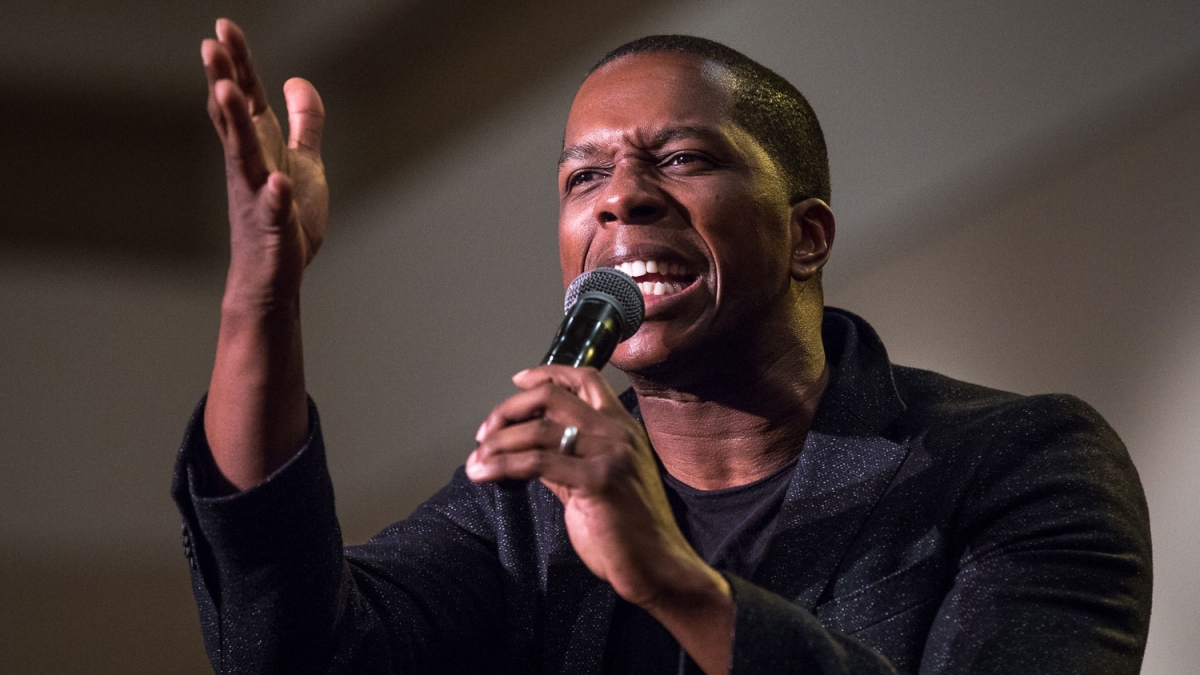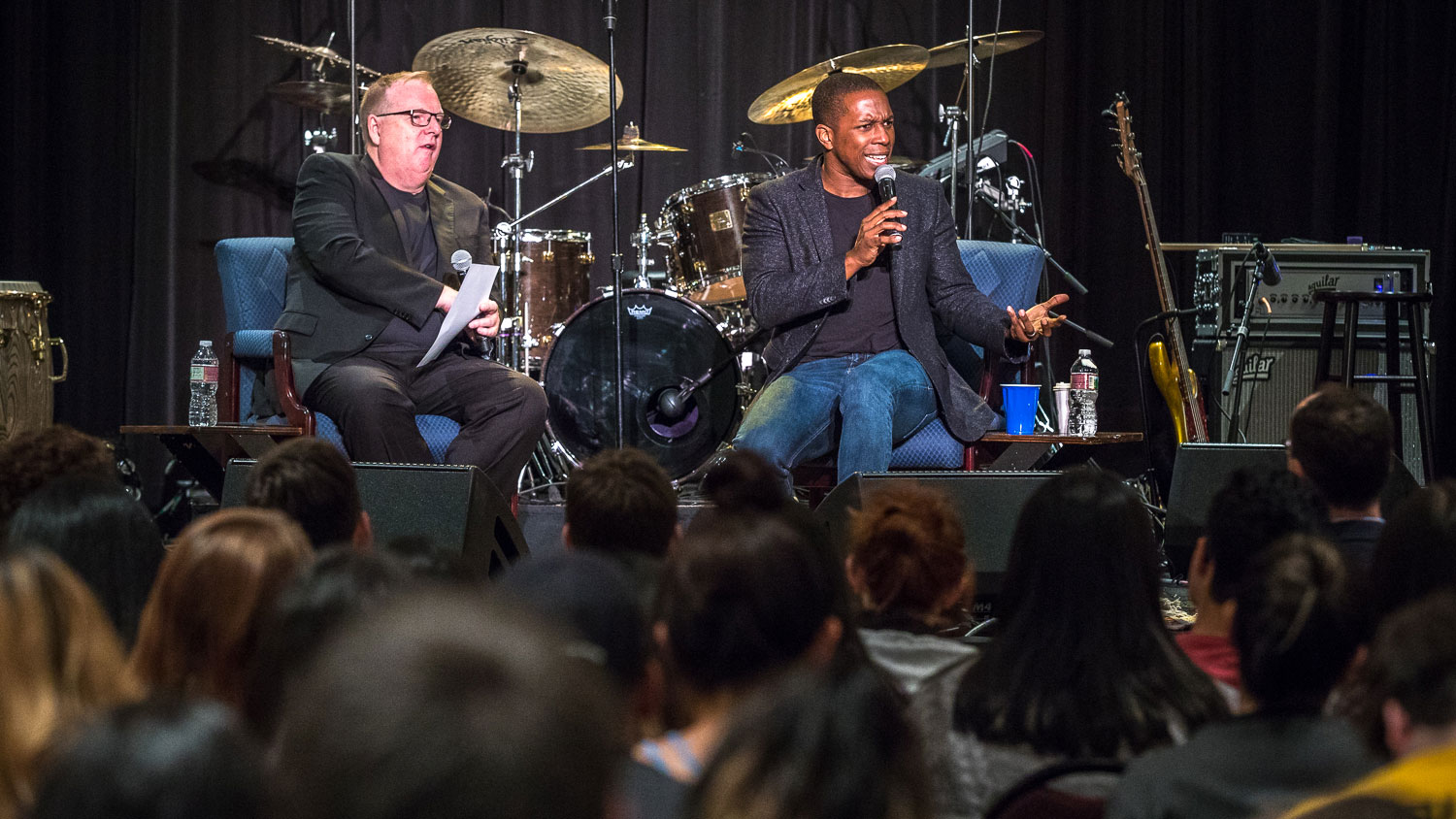Editor's note: This story is being highlighted in ASU Now's year in review. To read more top stories from 2017, click here.
Actress Mindy Kaling tweeted Monday about how funny it is that how early you can say you saw the Broadway smash “Hamilton” has become a sort of “social currency.”
Leslie Odom Jr. can say he saw it even before it went off-Broadway, when it was being workshopped at Vassar in 2009 and was still just “The Hamilton Mixtape.” He went on to play the role of Aaron Burr in the musical, winning a Tony Award for best actor and a Grammy Award as a principal soloist.
On Monday evening, the actor — who has also appeared on Broadway in “Rent” and will appear on film in the upcoming “Murder on the Orient Express” — spoke at Arizona State University’s West campus about the creation of “Hamilton” and his role in and observations of the process. His talk was part of the annual Summer Community Read, which brings together ASU students, faculty and staff with members of the local community to read and reflect on a novel, culminating with an on-campus discussion with the author or related individuals.
This year’s book was “Hamilton: The Revolution” by Lin-Manuel Miranda and Jeremy McCarter. (Odom’s own book, “Failing Up: How to Take Risks, Aim Higher, and Never Stop Learning,” will be released in March 2018 and focuses on unlocking your true potential and making your dreams come true even when it seems impossible.)
“This thing called Community Read … provides a shared experience for our new freshmen so that they all have a common intellectual experience to discuss from the very moment they step on campus,” ASU West Dean Todd Sandrin said. And the nontraditional nature of “Hamilton,” renowned for its revolutionary use of hip-hop, “underscores in many ways the ASU approach to education.”
That is, Sandrin said, “it epitomizes interdisciplinarity,” something the West campus’ New College is named for, by going outside the bounds of what was thought possible or acceptable and integrating new and unexpected approaches to create something unique that fills a void.
Odom echoed that sentiment when he talked about just how special “Hamilton” was to him and how lucky he felt to have been a part of it.
“I hope at some point in your life,” he told the crowd, “you find your way to something that is that special. If you can find yourself one company, one startup, one case to try, one medical discovery that makes a difference, one thing in which you feel used to your highest capacity, where you’re like, 'This is me at my best,' then you are divinely blessed. … And I got that.”
Leslie Odom, Jr., who played Aaron Burr in "Hamilton," speaks with ASU Assistant Professor Jeff Kennedy in front of more than 400 students and faculty on the West campus on Monday. Odom would be performing with his band later in the evening. Photo by Charlie Leight/ASU Now
He encouraged students to work toward finding something similar by having a goal in mind that they truly believe in and are willing to “sink [their] teeth into.”
“If you can make sure that your life’s work is in service of your passion, all the better. Because then it’s not six years of torture, it’s six years walking down the thing that you love,” Odom said, referring to the six years it took Miranda to write “Hamilton,” which could arguably become his life’s noted work.
“Whatever it is that you are deciding to pursue, it’s going to take you a minute to walk that thing down. So it’s going to be a lot easier, you’re going to enjoy life a lot more if it’s something that you love, that uses you in the best way, something [that will allow you] to be able to change the industry you care about.”
In a separate concert later in the evening at ASU West, Odom performed songs from “Hamilton” as well as his eponymous solo recording, which reached No. 1 on the Billboard Jazz charts.
Top photo: Leslie Odom, Jr., who performed as Aaron Burr in Lin-Manuel Miranda's epic musical "Hamilton" on Broadway, speaks Monday at ASU West. Odom spoke of the importance of acting from the heart, the relentless push toward perfection and his thought on the popularity of the play about America's founding fathers. Photo by Charlie Leight/ASU Now
More Arts, humanities and education

ASU professor's project helps students learn complex topics
One of Arizona State University’s top professors is using her signature research project to improve how college students learn science, technology, engineering, math and medicine.Micki Chi, who is a…

Award-winning playwright shares her scriptwriting process with ASU students
Actions speak louder than words. That’s why award-winning playwright Y York is workshopping her latest play, "Becoming Awesome," with actors at Arizona State University this week. “I want…

Exceeding great expectations in downtown Mesa
Anyone visiting downtown Mesa over the past couple of years has a lot to rave about: The bevy of restaurants, unique local shops, entertainment venues and inviting spaces that beg for attention from…



